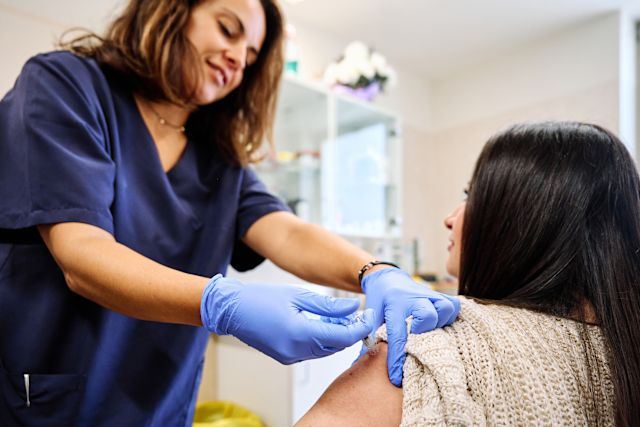Updated on March 28, 2025.
The COVID pandemic has long since come to an end. There are now varying levels of immunity in people around the world, offering protection that was not available when the virus first emerged. Thanks to effective vaccines and treatments, more people have acquired immunity from the disease through immunization and/or recovery from infection.
Learn more about what this means now—and in the future.
Immunity 101
When antibodies to an infection are present in someone’s body, that person can be said to be immune to that disease. Antibodies are created by the body in response to disease-carrying organisms, like viruses, to fight and destroy them. The body creates a unique set of antibodies for each disease, meaning mumps antibodies can’t be borrowed by the immune system to fight measles.
The body doesn’t automatically know to make these antibodies, however. It has to first be introduced to the disease organism in order to trigger the immune system to make the antibodies. The body might be exposed to the disease in one of two ways: actively or passively.
Active immunity happens when the body gets direct exposure to the disease. To gain active immunity, the body has to either be infected with the actual disease or be introduced to it through a vaccine. Once it’s introduced to the disease, it can take several weeks to make the special antibodies unique to that disease. But after that, the immune system can remember a disease for a long time, sometimes for the rest of a person's life, and fight it off successfully. For example, if you contract hepatitis A and recover, you’ll be protected from hep A infection in the future.
Passive immunity can happen when someone is given antibodies instead of making them on their own. Babies can get passive immunity through their mother’s placenta. Certain blood products that have antibodies in them, like immune globulin, can also be given to someone to help provide them with passive immunity. Passive immunity can happen very quickly, but it also dissipates quickly. Unlike active immunity, passive immunity may last for just weeks or months rather than a lifetime.
Because of this, it’s important to not lean on having had COVID before. It does protect you for a little while, but it will likely stop protecting you sooner than if you were vaccinated.
What is hybrid immunity?
People who were infected with COVID and also received the COVID vaccines have hybrid immunity. Research shows this protection can be stronger than if they had only been infected with the COVID virus. A 2023 systematic review published in The Lancet Infectious Diseases examined this type of immunity and compared it to the kind of immunity that comes from only having had an infection (but no vaccination).
Researchers found that the people who’d had both a past infection and a vaccination—in other words, people with hybrid immunity—had the strongest and most long-lasting protection against both reinfection and severe illness.
So, even if someone got COVID and recovered, they should still get vaccinated. Immunity from infection likely doesn’t last as long as immunity from the vaccines. And if you get vaccinated after being infected, it will bolster your protection.
What is herd immunity?
Herd immunity is achieved once enough people survive infection and/or get vaccinated, making the spread of the disease unlikely—at least for a certain period of time, depending on how long immunity lasts.
Some diseases, like measles, are good candidates for causing herd immunity. The measles virus spreads fast among unvaccinated people who’ve never had vaccine. But at a certain point, when most people have either had measles or been vaccinated against it, the virus doesn’t have many people left to infect. Herd immunity is effectively reached, which means the most vulnerable members of society are protected, like infants who are too young to receive the measles vaccine.
But when it comes to COVID, reaching herd immunity may be difficult or even impossible. Unlike the more stable measles virus, the virus that causes COVID mutates frequently over time. That means the body has to repeatedly learn the virus’ new tricks and shapes, so immunity built against one virus variant may not fully protect against a new virus variant.
So, because of increases in the number of recovered people and in the number of people with hybrid immunity, we’ve learned to live with COVID, just like the flu and other viruses that remain in circulation.
Is COVID now endemic?
When the outbreak of a disease becomes entrenched and stable in a place, it might be said to be endemic—an inescapable part of the health landscape. People stop talking about the virus as something to run from and start thinking of it as something to “live with,” similar to the way we’ve long lived with the common cold.
However, while the common cold is usually not a serious illness, it’s important to understand that “endemic” doesn’t mean “not dangerous anymore.” It simply means it’s there to stay for the foreseeable future.
Some experts believe we’ve reached the point where COVID is indeed endemic, but many do not, pointing to the unstable nature of infection waves around the world, the unpredictability of the virus, and the low vaccine uptake.







